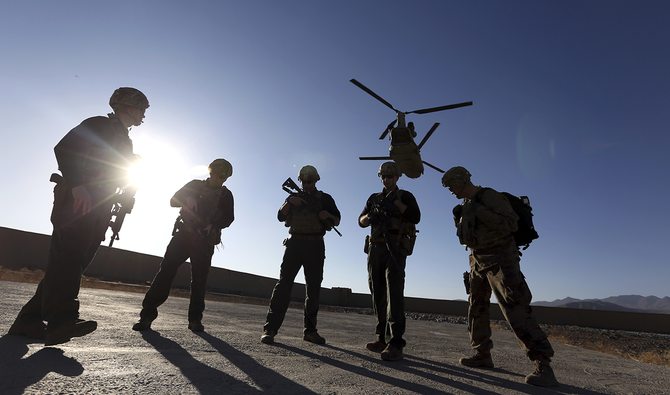KABUL: Russia has aided the Taliban for years to force a US withdrawal from Kabul and undermine American influence in the war-ravaged country, a governor and several former Afghan officials told Arab News on Saturday.
Rahmatullah Nabil, director of Afghanistan’s intelligence until 2015, said: “Moscow initiated contact with the Taliban through Iran before 2014, just as Daesh emerged in Afghanistan. Russia believed that the Taliban, unlike Daesh, only had a local agenda and no external ambition.”
He added that Russian engagement with the Taliban began with a “covert meeting in a central Asian country in 2014/2015.”
Nabil’s claims follow news reports last week that allege Moscow offered bounties to the Taliban for the killing of US soldiers in Afghanistan.
The reports, based on US intelligence, were established from intercepted electronic data which showed financial transactions between Russia’s military intelligence agency and a Taliban-linked account. US officials have also named an Afghan contractor who acted as a key middleman in the relationship.
Afghanistan is seen as an important area of Russian foreign policy. Moscow has long regarded Kabul as a key part of its sphere of influence in Central Asia.
Nabil said Russia built ties with the Taliban by investing in key areas and supplying weapons.
“Russia invested in four layers in Afghanistan — high-ranking government officials, politicians, Taliban and local warlords in the north. To the first two categories, it sent financial support through Hawala (a traditional tool for money transfers) through some Afghan businessmen, and a top-up in fuel which was exported to Afghanistan,” he said.
He added that weapons “were given at some borders and crossing points.”
“In 2016, Moscow also handed over 10,000 AK-47s to government forces. Even the government does not know where the rifles are,” he said.
Moscow welcomed the toppling of the Taliban in the 2001 US-led invasion, but over the years it has — like its regional ally Iran — spoken against an extended US presence in the country.
Experts say Russia’s complaints have been long in the making.
It began with the Soviet invasion of Afghanistan in the 1980s, with Russia accusing the US and other Western countries of supplying weapons to Mujahideen factions who fought against Soviet troops.
Russia was eventually forced to retreat from Kabul after nearly 10 years of bloody occupation, creating a deep mistrust between Moscow and Washington, which eventually lead to Russia aiding the Taliban in its bid to force a US withdrawal.
Ghulam Rabbani Rabbani, a member of Kunduz’s provincial council, said he was “not surprised” to learn that Russia was using the Taliban. He added that Rahmatullah Azizi, an Afghan businessman, had acted as a middleman between the two groups.
“Azizi has disappeared all of a sudden, but the intelligence agency has arrested four people close to him,” Rabbani told Arab News.
Others said the war in Afghanistan had both “regional and international dimensions,” and that Russia was just one of the players in the “great game.”
“The war here is not between the government and the Taliban, otherwise you would have already seen a winner,” Dawlat Waziri, a retired defense ministry general, told Arab News, adding that Moscow was tending to old wounds.
“Russia wants the US to suffer a defeat like it did. It wants America to lose soldiers and see the downfall of its economy so that it is forced to leave Afghanistan,” he said.
Anwar Jigdalak, a former governor of Kunduz province, agreed.
Citing locals in northern Kunduz, 335 km north of Kabul, he said the Taliban had once sent one of its shadow governors, Mawlavi Abdul Salaam, to Tajikistan to hold talks with Russian officials and strengthen their relationship.
Kunduz is a strategic province which lies close to Tajikistan, and was the first city seized by the Taliban in 2015 “with the help of Russian intelligence,” Jigdalak said.
“But when Salaam returned to Afghanistan, an American killed him in an air strike. When Moscow wants to be present in Syria, which is very far, why not have influence in Afghanistan which is close,” he added, referring in part to the Russian support of Syria’s Assad regime.
Experts say other issues are at stake, too.
Aimal Faizi, an analyst, said the allegations of Russian bounties are “part of an effort by some to keep troops in Afghanistan.”
He tweeted: “They have been trying to prolong the US war and occupation in Afghanistan by different means.”
Both Moscow and the Taliban have repeatedly denied the allegations. Zabihullah Mujahid, a Taliban spokesman, told Arab News on Thursday that the reports were “false,” and spread “to keep US troops in Afghanistan to confront its enemies.”
He added: “Our contacts with Russia have been all the time for political and diplomatic goals only.”
Last week’s report comes amid a push by several current and former US generals to keep US troops in Afghanistan, an important condition for a historic peace deal signed with the Taliban in late February this year.
If it happens, it could throw the spotlight on President Donald Trump’s campaign pledge to withdraw all troops from the country.
Trump, who is standing for re-election in November, said all soldiers would leave by next spring based on the February agreement.














